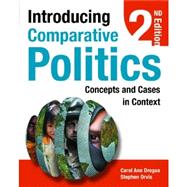Introducing Comparative Politics: Concepts and Cases in Context, 2nd Edition
, by Carol Ann Drogus; Stephen Orvis- ISBN: 9781608716685 | 1608716686
- Cover: Paperback
- Copyright: 7/21/2011
Uncomfortable with a strictly thematic approach, or tired of a purely country-by-country organization for your comparative politics course? Teach the way you want to teach with this innovative hybrid book-fully accessible to students, easy to teach, and satisfying to professors who want to give students a real sense of the questions that drive research in the fi eld. Organized thematically around important concepts in comparative politics-Who rules? What explains political behavior? Where and why?-the book integrates a set of extended case studies in eleven "core" countries. Serving as consistent geographic touchstones, the cases are set in chapters where they make the most sense substantively-not separated from theory or in a separate volume-and vividly illustrate issues in cross-national context. Features include: Core country case studies: Brazil, China, Germany, Japan, India, Iran, Nigeria, Russia, the UK, the U.S., and, new to this edition, Mexico. NEW! Methods in Context boxes that model how comparativists do their research and analysis. In Context fact boxes that put eye-opening data into thematic context. Where and Why? boxes that explore why certain political outcomes occur in some countries but not in others. Country and Concept tables that display key indicators for core countries. Updates and revisions include: recent elections around the world and the eff ects of the global fi nancial crisis and its aftermath, authoritarian versus totalitarian regimes, ethnic violence, racial politics and identity, economic globalization, executive-legislative institutions, and the role of civil society in government.







